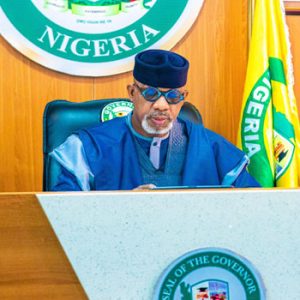•Governor Umo Eno
In a country where politics often thrives on noise, drama, and spectacle, Akwa Ibom State is charting a different course. At the helm is Governor Umo Eno, a man whose leadership style is as unassuming as it is transformative.
He is not a bombastic leader but of quiet conviction. Yet in just over two years, his imprint on Nigeria’s subnational governance is resonating far beyond the boundaries of his state, not because of the number of awards received but in lives touched and impacts made.
Governor Eno’s defining compass is the ARISE Agenda, a carefully crafted framework whose pillars touch agriculture, rural development, infrastructure, security, education, healthcare, human capacity development, and tourism.

It is not just a policy document but a living, breathing guide to sustainable development.
What makes it remarkable is not merely its scope but its execution. Projects are springing up in every nook and cranny across the state, turning intent into impact.
He operates a quota system of infrastructural development, where every local government through their leaders chooses priority infrastructures like roads, schools, and health institutions, for immediate intervention per time.
In every rural area in Akwa Ibom, one encounters newly tarred community roads linking farmlands to markets, healthcare centers are built and equipped from the scratch across villages once neglected, and standard model schools springing up across the state with facilities to prepare the next generation for a knowledge economy. Not to mention the ARISE Compassionate Homes scattered across the hinterlands, designed to provide shelter support to the vulnerable.
For Governor Eno, governance is not optics, it is impact. Little wonder he declared the state a “project site.”
Human capacity development is another pillar. Through the Ibom Leadership and Entrepreneurial Development Centre (Ibom-LED) and the Dakkada Skills Acquisition Centre (DASAC), over 2,000 citizens have been trained and supported with starter packs equipment, grants, even shops, to launch sustainable ventures. A further 7,688 residents recently received business support worth ₦10 billion during town square meetings across the state’s ten federal constituencies. At each stop, Pastor Eno engaged directly with communities, collected needs assessments, and pledged to anchor the 2026 budget on their inputs. This is leadership that listens and acts.
Speaking at the Akwa Ibom Economic Development Retreat in Uyo, the governor declared: “Tourism, agriculture, human capital, these are the new oil for Akwa Ibom. Our goal is simple: to build a state where prosperity is inclusive, sustainable, and enduring.”
Agriculture, for instance illustrates this vision. Beyond the Ibom model farm in Nsit Ubium, integrated farm estates are springing up across LGAs, combining cultivation, processing, and storage according to local advantage.
These are not just farms but economic ecosystems employing youths, cutting post-harvest losses, and feeding urban centers.
“By developing agro value chains rather than just farms, he is building an economy that can thrive long after oil,” noted Dr. Ayo Teriba, CEO of Economic Associates, at the Nigeria Economic Outlook Summit in Lagos on March 18, 2025.
Tourism, long overlooked in Nigeria, sits at the heart of Gov. Eno’s plans. The Ibom Tropicana Entertainment Centre is being reborn, the governor has added a shopping city; the once-abandoned Tropicana Hotel now Ibom Hotel, nears commissioning; Ibom Hotels and Golf Resort is being revamped; while at the Arise Resort a ravine has been reclaimed for leisure. Add the Four Points by Sheraton in Ikot Ekpene and the rebranding of Ibeno’s sweeping beachfront, one would see that Akwa Ibom through Umo Eno is positioning itself as West Africa’s new tourism frontier.

Cultural festivals, eco-tourism packages, and the Uyo Convention Centre are in the works, with Ibom Air serving as the logistical backbone for regional connectivity, while a brand-new smart international terminal awaits commissioning, the best of its kind in Nigeria.
Infrastructure follows a balanced philosophy: new projects alongside the maintenance of existing ones. Hospitals are being modernised, and a 200-bed international medical facility is underway to anchor a future medical hub. A corridor linking Uyo and Ikot Ekpene is planned to host pharmaceutical companies, elderly care homes, and doctor’s lodges.
In education, beyond the model schools springing up across the state, technical colleges are being revamped, while the Ibom Model Science Schools, a brainchild of Governor Eno, is rising as a beacon of academic innovation in the state.
Security remains a cornerstone. Through community policing initiatives like Ibom Community Watch, Modern Surveillance, and an almost-completed Command Center in Uyo, Akwa Ibom sustains its status as one of Nigeria’s safest states.
This foundation of safety underpins investment and tourism, complementing reforms in healthcare and education to produce a skilled, and healthy workforce.
Professor Pat Utomi, speaking at the Policy Innovation Dialogue hosted by the Centre for Values in Leadership in Abuja on April 9, 2025, summed it up: “What Governor Umo Eno is doing is not just governance, it is institution building. He is showing that with clarity of vision and consistency of action, even a Nigerian state can reinvent itself.”

It is this blend of humility and results that makes Governor Eno stand tall among equals. He does not chase headlines but legacies. His measure of leadership is the quiet dignity of lives improved.
Dr. Obiageli Ezekwesili, former World Bank Vice President for Africa, echoed the sentiment at the Nigeria Subnational Leadership Forum in Abuja on May 21, 2025: “Umo Eno represents the future of Nigerian subnational governance: focused, people-centered, and transformational. His ARISE Agenda is not just a plan for Akwa Ibom; it is a template for the country.”
Akwa Ibom is today on the cusp of an economic renaissance. By diversifying beyond oil and building around agriculture, tourism, human capital, and infrastructure, the state is shaping a modern, resilient, and globally competitive identity. For Nigeria, it is a glimpse of what intentional leadership can achieve.
In an era crowded with loud voices and fleeting promises, Umo Eno’s calm but determined leadership is a quiet revolution. His story reminds us that the tallest leaders are not always the loudest, but those whose results speak in silence.



























